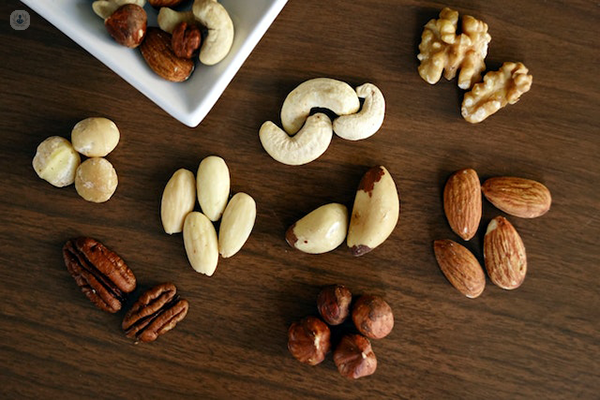What is the difference between a food allergy and a food intolerance?
Written in association with:Distinguished consultant paediatric allergist Professor George Du Toit sheds light on the most common types of food allergies which affect adults and children in this informative article. The leading specialist also offers his expert insight on the difference between food allergies and food intolerances and emerging forms of treatment which relate to desensitisation of allergens.

What is the difference between a food allergy and a food intolerance?
A food allergy and a food intolerance are two different types of adverse reactions to food.
A food allergy is an immune system response to a food protein that the body perceives as harmful. When a person with a food allergy eats the food that they are allergic to, their immune system releases histamine and other chemicals in an attempt to protect the body. This can cause a range of symptoms, from mild (such as hives or a runny nose) to severe (such as anaphylaxis, a potentially life-threatening condition that can cause difficulty breathing and a rapid drop in blood pressure).
Food allergies are caused by the immune system mistakenly identifying certain proteins in food as harmful. A food intolerance, on the other hand, is a non-immune reaction to a food. A food intolerance occurs when a person has difficulty digesting a certain food, typically because they lack the enzymes needed to break it down. Symptoms of a food intolerance can include bloating, gas, diarrhoea, and stomach pain. Food intolerances are not life-threatening, and they don't involve the immune system.
What are some common food allergens in children?
Some common food allergens in children include:
Milk
Milk is one of the most common food allergens in children, and it's estimated that up to two point five per cent of children under the age of three are allergic to it. This form of allergy is typically outgrown in the first decade of life, with tolerance coming to baked forms of the food in the first instance.
Eggs
Egg allergies are also common in children, and they can occur at any age. Allergy to raw or undercooked egg white is more common than to cooked egg. Egg allergy is also commonly outgrown.
Peanuts
Peanut allergies are among the most common and severe food allergies in children. It is estimated that about one per cent of children are allergic to peanuts. This form of allergy is seldom outgrown.
Tree nuts
Tree nut allergies, such as cashew, almonds, walnuts, and pecans, are also common in children and can be severe. Like peanut, this allergy is seldom outgrown.
Soy
Soy allergies are less common but can also cause severe symptoms.
Wheat
Wheat allergies are less common than others but can also cause severe symptoms.
Fish and shellfish
Fish and shellfish allergies are also common in children, and they can cause severe reactions.
It's worth noting that many children who are allergic to a certain food in early childhood may outgrow their allergy as they get older.
What are some common food allergens in adults?
Some common food allergens in adults include:
Shellfish
Shellfish allergies, such as shrimp, lobster, and crab, are more common in adults than in children.
Fish
Fish allergies are also more common in adults than in children, and they can cause severe reactions.
Peanuts
Peanut allergies are among the most common and severe food allergies in adults.
Tree nuts
Tree nut allergies (such as almonds, walnuts, and pecans) are also common in adults and can be severe.
Soy
Soy allergies are less common than the others but can also cause severe symptoms.
Wheat
Wheat allergies are less common than others but can also cause severe symptoms.
Milk and egg allergies are uncommon in adults as they are outgrown by most patients in the first decade of life. It's worth noting that food allergies can occur at any age, and that some people may develop allergies to foods they previously tolerated. Also, it is important to note that there are many other foods that can cause an allergic reaction.
Are food allergies more common in children or adults?
Food allergies are more common in children than in adults. In fact, it is estimated that food allergies affect around eight per cent of children under the age of eighteen in industrialised countries, while they affect around four per cent of adults.
Certain food allergies, such as milk and egg allergies, are more likely to occur in childhood and may be outgrown as the child gets older. Peanut and tree nut allergies, on the other hand, are more likely to persist throughout a person's lifetime.
Is there a cure for food allergies or can they only be managed through avoidance?
Currently, there is no cure for food allergies and the only way to manage them is through avoidance of the allergenic food.
Avoidance means not consuming the allergenic food and also being aware of cross-contamination, which can occur when the allergenic food comes into contact with other foods, utensils or surfaces. Training is required for the patient and caregivers in the recognition and appropriate treatment of allergic reactions.
There are some emerging treatments for food allergies such as oral immunotherapy (OIT), which involves consuming small, gradually increasing amounts of the allergenic food in order to build up tolerance. Only one product, Palforzia, is licensed for the moderation of peanut allergy in children aged between four and seventeen years. Natural, everyday foods have also been used for desensitisation, however, these other treatments are still considered investigational and are not widely available.
Another treatment that is being researched is sublingual immunotherapy (SLIT), which is similar to oral immunotherapy but involves administering small doses of the allergenic food under the tongue. Studies in this area are underway.
There are also studies looking into the moderation of peanut allergy through application of a patch which contains small amounts of peanut (Viaskin patch).
It is important to note that these treatments still require strict avoidance of the allergenic food, and are not considered a cure for food allergies. It is always important to consult an allergist, who can help to diagnose and manage food allergies and also provide guidance on the best course of action for each individual case.
Is it possible to build up desensitisation to foods you are allergic to?
There is some evidence to suggest that it may be possible to build up desensitisation or tolerance to certain food allergens through certain treatments such as oral immunotherapy (OIT) and sublingual immunotherapy (SLIT).
Oral immunotherapy (OIT) is a treatment in which small, gradually increasing amounts of the allergenic food are consumed under close medical supervision in order to build up tolerance to the food. This treatment has been found to be effective for some people with food allergies, particularly for children with milk, egg, and peanut allergies. However, OIT is not yet widely available and should only be used under the strict supervision of a specialist allergy team.
You can read more about how food allergies are categorised and diagnosed in another of Professor Du Toit’s detailed articles on the topic.
If you wish to schedule a consultation with Professor Du Toit, you can do so by visiting his Top Doctors profile.


